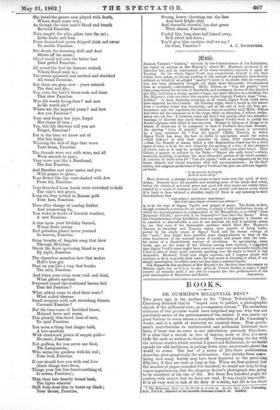Mt*.
SIGNOR VERDI'S " Cantles," rejected by the Commissioners of the Exhibition, has found an asylum at Her kajesty's, where Mr. Mapleson produced it on Saturday last, and in consequence of its warm reception, repeated it again on Tuesday. On the whole, Signor Verdi may congratulate himself in the turn events have taken, as (to say nothing of the amount of popularity immediately enlisted on behalf of an alleged " martyr") there is no doubt that his composi- tion has been ultimately brought out under more favourable circumstances than as originally contemplated. Mdlle. Titiens, as "Una del popolo," more than compensated for the loss of Tamberlik, and a compact chorus of two hundred and fifty, including a strong operatic troupe, are more effective in a building like Her Majesty's, than ten times this number under Captain Fowke's huge "soap- bubbles." A more flattering reception, at all events, Signor Verdi could never have expected for his Cantata. On Tuesday night, when I heard it, the encore from a crowded house was irresistible, and at the end of both the first per formances and the repetition the audience was not satisfied until Mdlle. Tittens bad twice led the composer on to the stage, while on Saturday, I believe, enthu-
siasm was not less. however, must say that I was unable, after two attentive hearings, to discover any merit whatever in Signor Verdi's work to justify the frantic applause with which it was received. Neither in loftiness of desiga or in beauty of detail can it be compared to that of Professor Storndale Bennett. An opening " Coro di populo," chiefly in pompous unison, is succeeded
by a long recitative for " Una del popolo' Titiens), in which Signor Verdi has done his best to clothe in appropriate music the notion —still believed in with fond credulity by some, 1851 notwithstanding —that the Temple of Janus, which a new dispensation closed but for a short space of time, is to be for ever closed by the opening of a fair, of the existence of which, vast as it may be, probably half the world have never heard. Then follows a prayer, or address to the Deity—" Signor the sulla terra"—which, musically speaking, is perhaps the most attractive portion of the whole cantata. It consists of short solos for " Una del popolo," with an accompaniment for two harps obligati, and choral responses with full accompaniments. In the final stanza, the sanguine predictions of Signor Verdi and his poet are still less vaguely set forth:
" E un mondo di hula!, Sea la terra anon" Here, however, a strange change seems to have come over the spirit of their dream. Scarcely have the peaceful and soothing notes of the harps died away, before the visions of universal peace and good will they excite are rudely inter- rupted by a crash of trumpets and drums, and certain well-known notes which it is hard to hear without a shudder, imply (if there is any meaning in their introduction) that " Aux armes! marehons! marahons I Que lour sang 'raw abreuve nos sillons I" is to be the text of Signor Verdi's new gospel of peace. The finale, in fact, though nominally a chorus for all nations, is simply a wild Garibaldian hymn, of which the accompaniment is compounded of the Marseillaise, a so-called "Inno
Nazionale and—will it be believed?—" God Save the Queen." Even the Commissioners of the Exhibition were not equal to so gigantic a blunder as to sanction so discreditable a use of our national air, and it certainly seems to me that even if the fashionable audience which filled Her Majesty's Theatre on Saturday and Tuesday nights were capable of being trans- ported by the empty music of Signor Verdi and the insane ravings of his "poet," they might have justified some disapprobation at least at the close association of our national hymn of loyalty and prayer with the hate- ful strain of a blood-thirsty war-cry of revolution. In speculating, some weeks ago, on the cause of the Cantata having been rejected, I suggested that Signor Verdi's muse might have soared to some very undesirable height, but I had no idea of what, more correctly speaking, was the depth to which it had descended. However, Verdi now reigns supreme, and I suppose people will continue to flock to gratify their taste for bad music in listening to what, if not simply meaningless, is neither more nor less than a national insult. Lea Huguenots was produced at Her Majesty's for the first time this season on Monday night, but as it is to be also given at Covent Garden to-night, I shall reserve all remarks until I am able to compare the two performances of the
joint masterpiece of Meyerbeer and Scribe. AMATEUR.






























 Previous page
Previous page